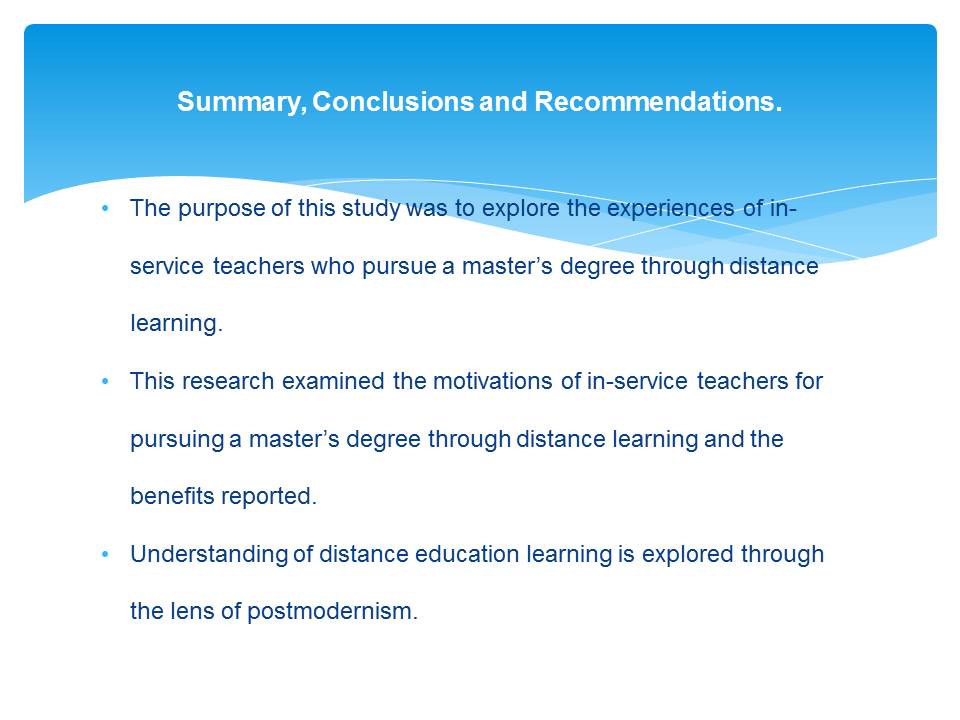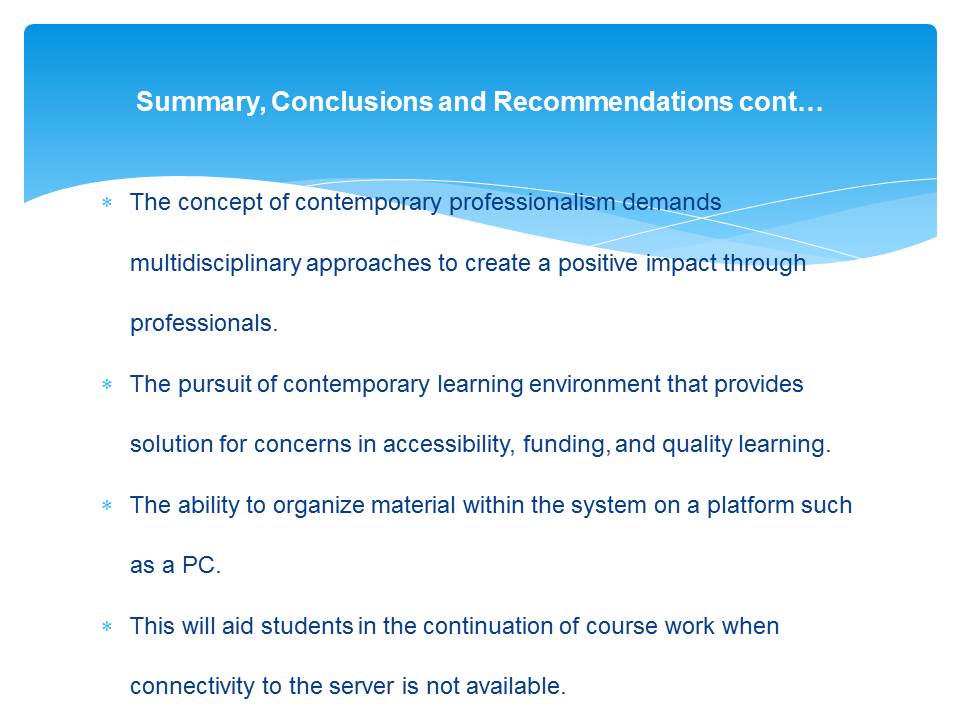Background and Context
- ICT impacts the educational institutions.
- Distance-learning teachers can use ICT to learn.
- Interaction is important to distance learners.
- Interaction strategies depend on institution’s technology.
- Technologies can be synchronous or asynchronous.
- The technologies create flexible learning environment.
- Interaction occurs when students access graphic representations.
- Interaction with learners in groups promotes cooperative learning.
- Technology should be aligned with the task.
- Effective communication is required in distance learning.
- Interactions with technology manipulation of electronic tools.
- Learners should bring experiences to the course content.
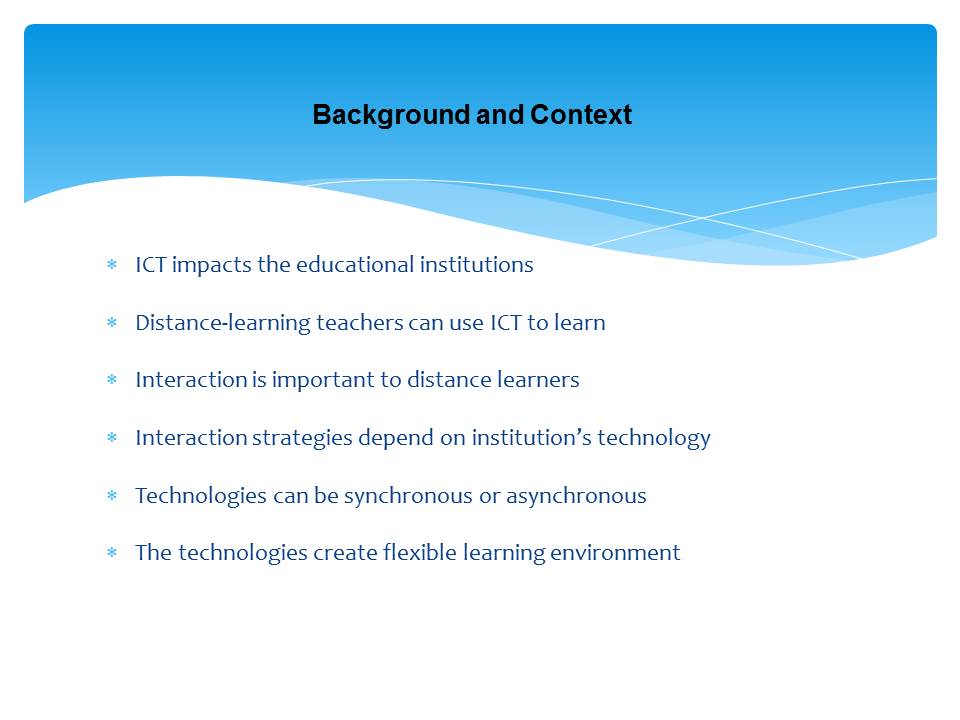
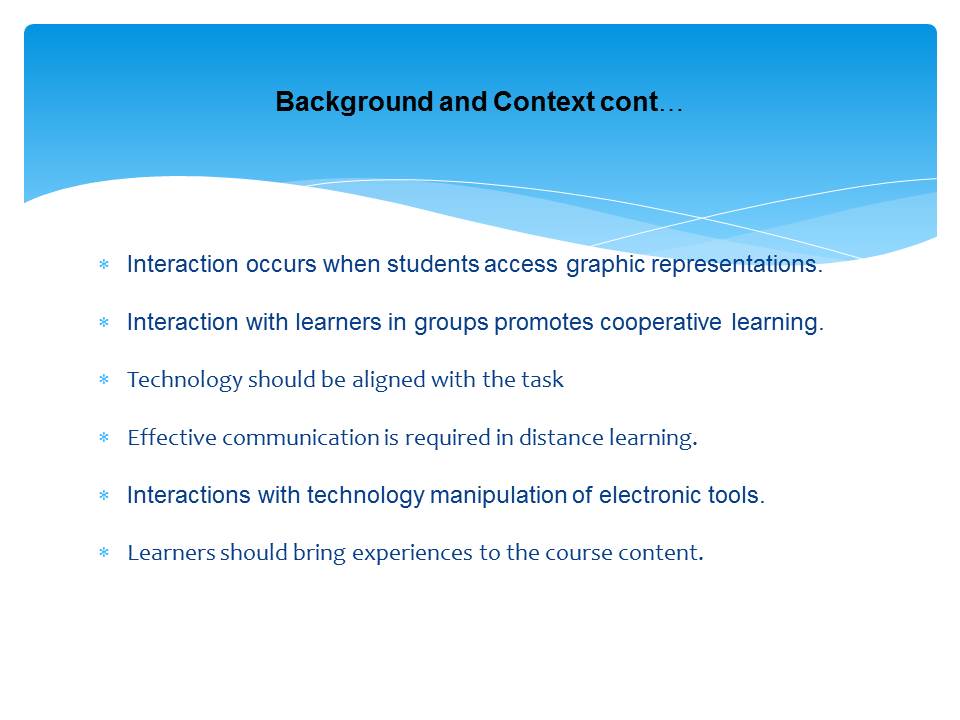
An Overview of the Topic
- Distance learning began in 1700s.
- It was conducted through mail services.
- In 1800s, women obtained education at homes.
- With advancement of technology, distance learning flourished.
- With computer development the internet was born.
- Today, technology plays a crucial role in distance learning.
- Pedagogy involves learning content and environment.
- Self-study is not a new practice.
- Distance learning systems compensate lack of student supervision.
- Teachers used lesson materials in early years of distance learning.
- The acceptance of distance learning has indicated its success.
- In informal education, distance learning delivered several educational subjects.
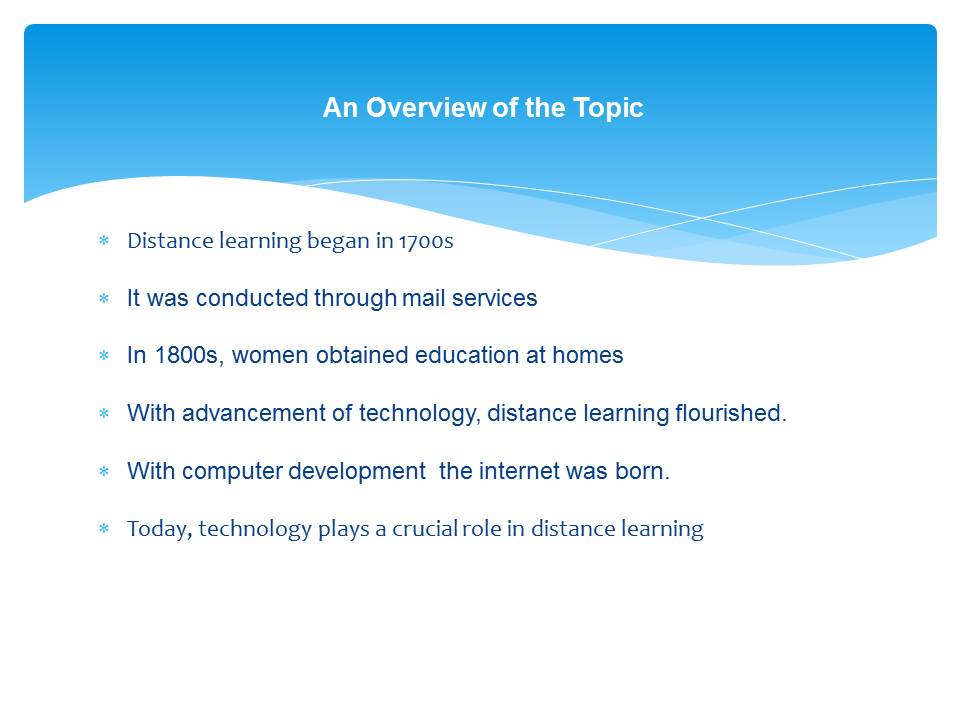
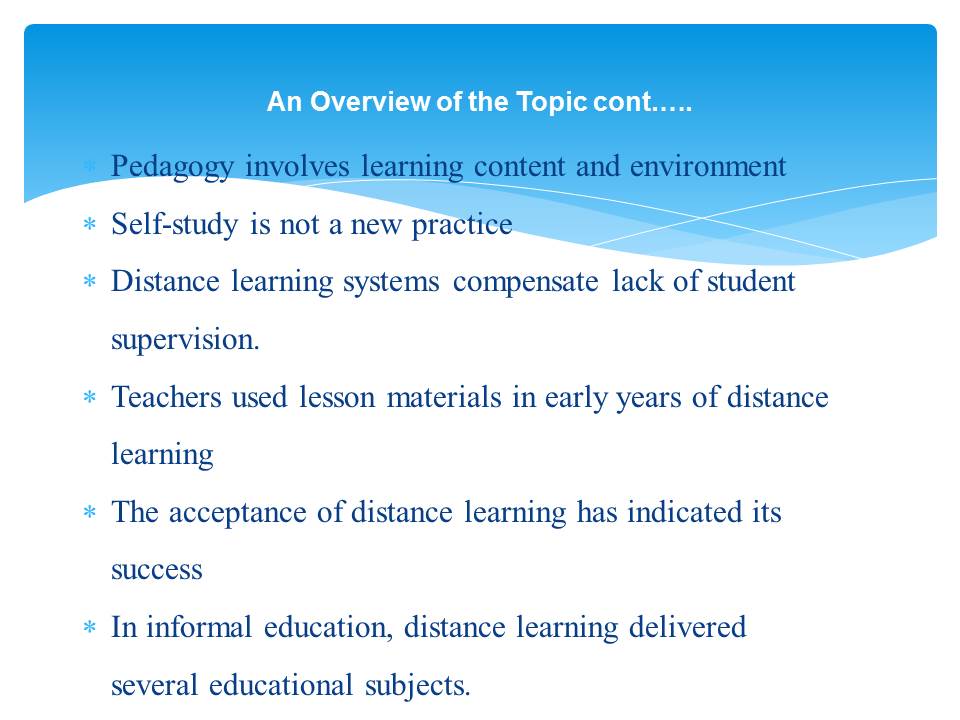
Rationale for the Study
- Distance learning allows study without traveling to the campus.
- The conventional methods have been in a singular classroom environment.
- Distance learning is employed in a variety of education settings.
- However, technological learning is new in the U.S. music program.
- Patterns of learning have changed due to occupational practice.
- This study contributes to the existing literature about distance learning.
- In-service music teachers have limited time for on-campus learning.
- They also have limited financial resources.
- Distance learning students encounter poor instructional delivery.
- Understanding of in-service teachers in distance learning is explained.
- This research is significant for graduate students.
- It is focused on online degree programs.
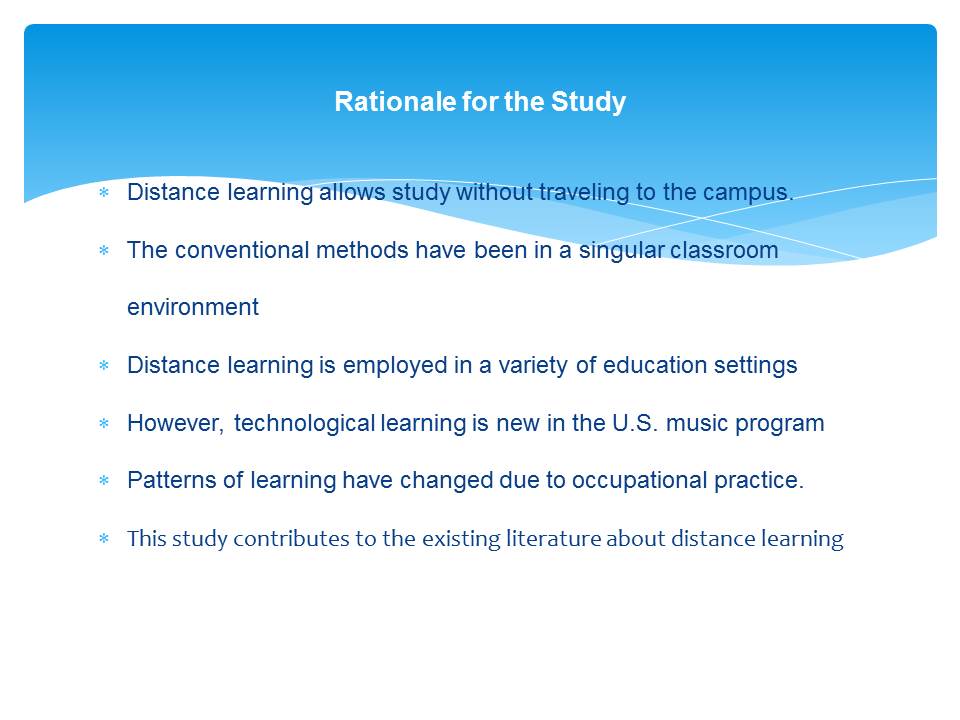
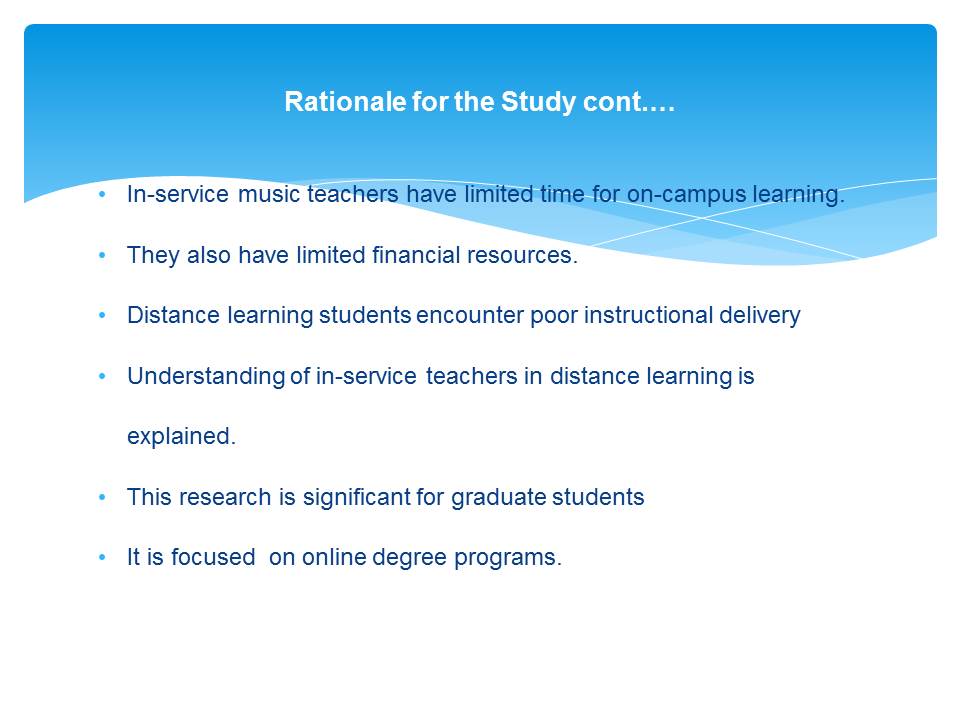
Purpose and Need
- The study explores the experiences of in-service music teachers in distance learning.
- This paper examines the motivations of in-service teachers in distance learning.
- Also, benefits experiences, and challenges have been explored.
- This study considered the current skepticism toward distance learning in music education.
- Results of this study help understand the experiences of students in distance learning master’s programs.
- Further investigation into the experiences of students engaged in distance learning was requested by researchers.
- No previous studies have explored experiences of students in distance learning.
- This research assist instructors in improving curriculum content
- Also, strategies for teaching and learning are enriched.
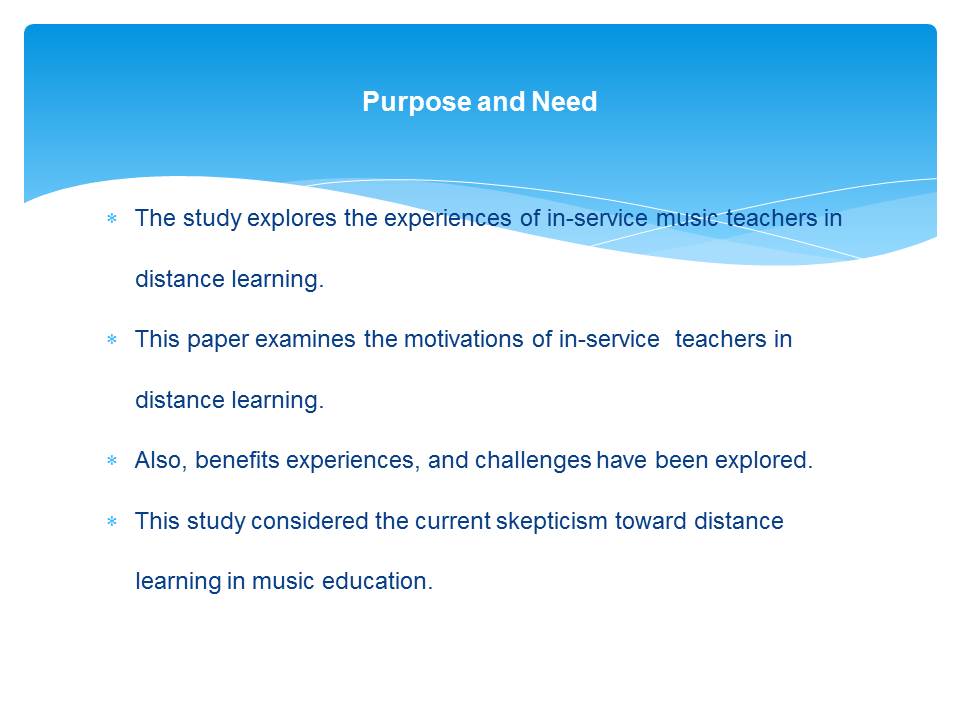
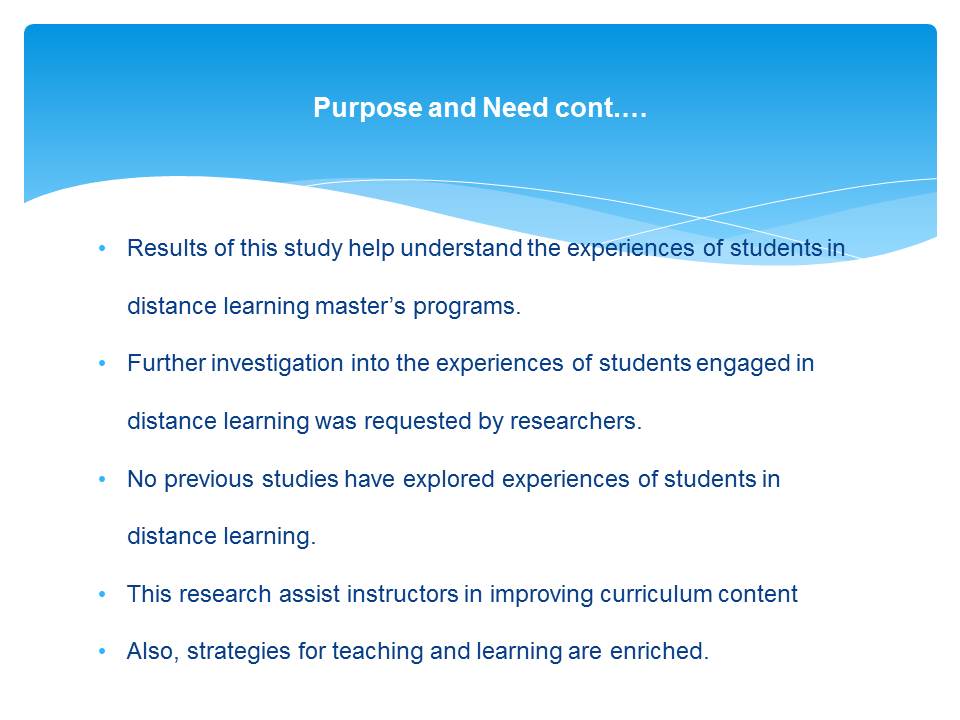
Research Questions
- What motivations do in-service music teachers cite for choosing to pursue a master’s degree in music education through distance learning?
- What benefits do in-service music teachers report as a result of enrolling in a master of education distance learning program?
- What challenges do in-service music teachers report facing when studying in an online graduate distance learning program?
- What learning experiences do in-service music teachers in a graduate distance learning program find significant for their profession and teaching environments?
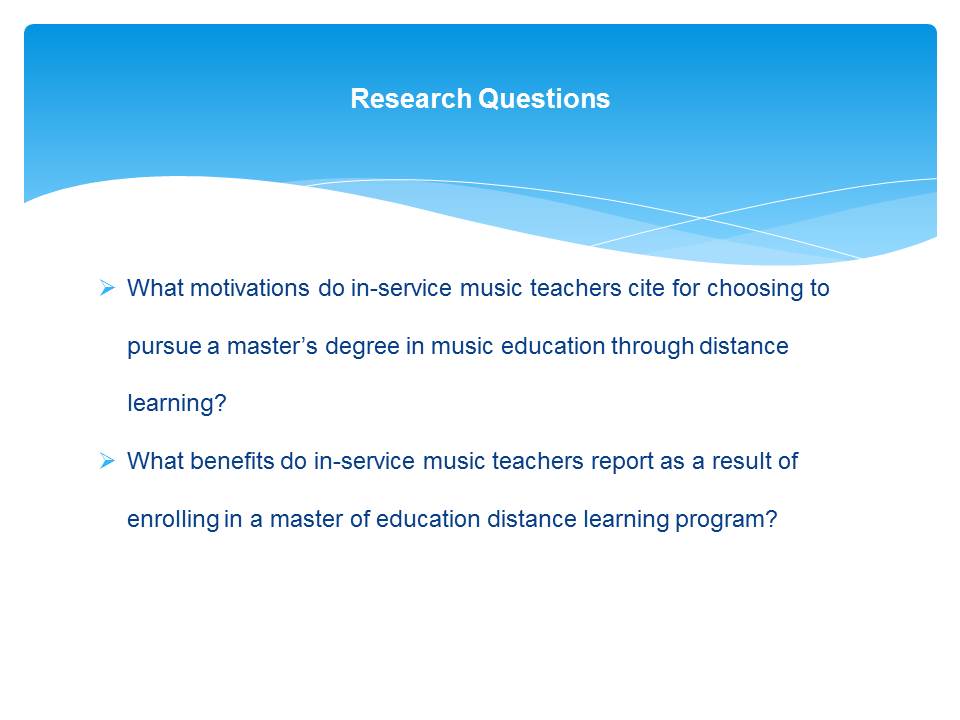
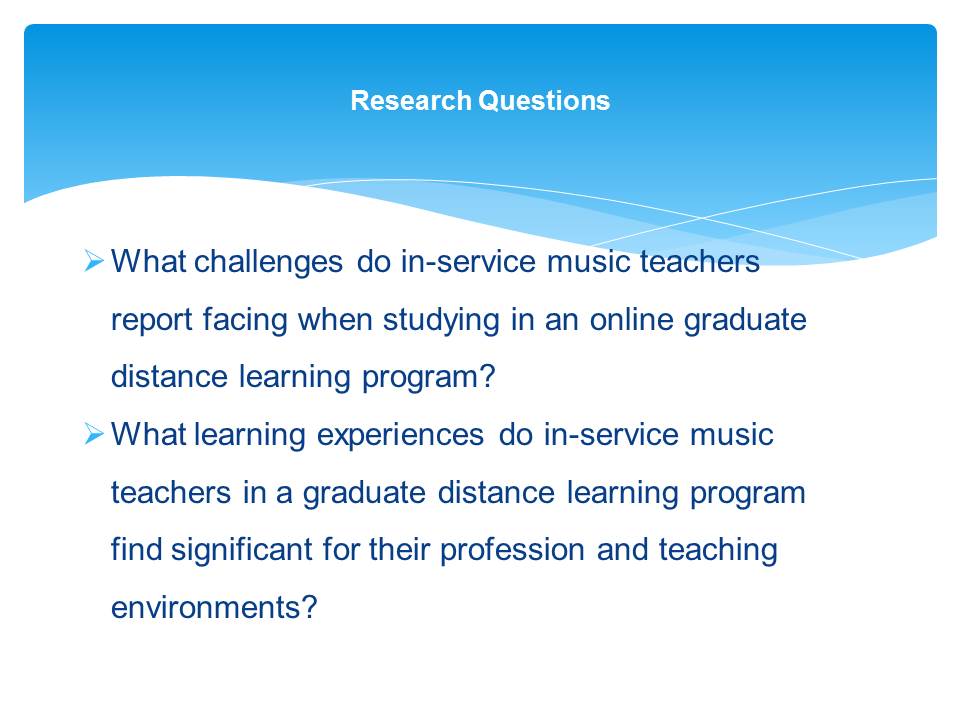
Procedures
- Teachers enrolled in an online master’s degree program in music education were interviewed.
- Insight to their experiences was gained.
- An interview protocol that contained a set of predetermined open-ended questions was used.
- This was used to ensure consistency across all interviews.
- Interviews were audio-recorded, and transcripts were prepared.
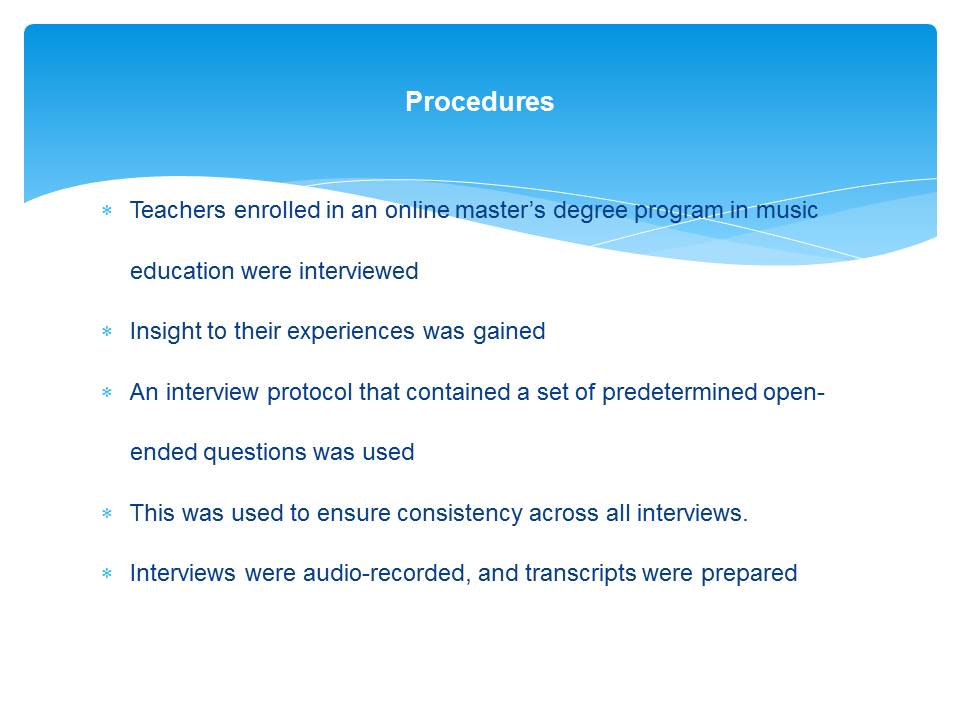
Assumptions, Scope, Limitations and Delimitations
- The in-service music teachers interviewed were highly qualified.
- The interviews revealed a common area of knowledge about graduate level online music education.
- Being in-service teachers, most participants were deeply engrossed in career development and professional activities.
- This left little time for participation in such research.
- The study was limited to data collected from one academic institution that offers a master’s degree in music education through distance learning.
- The scope of the research results was within the educational circles of in-service teachers enrolled in distance learning master’s programs.
- It was limited to participants from online music education at the master’s degree level.
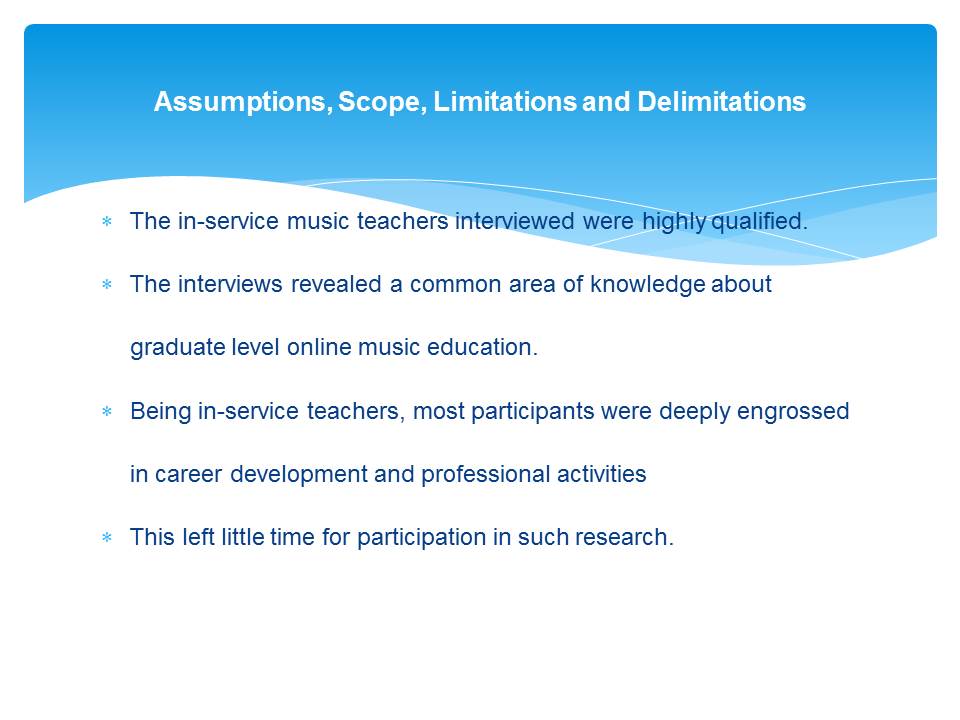
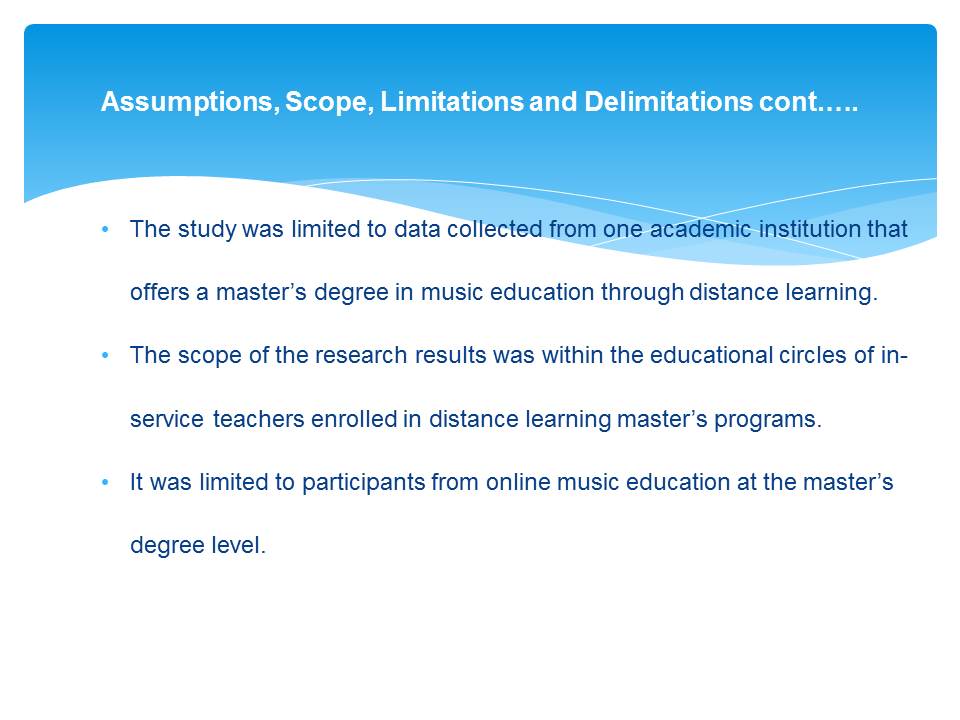
Theoretical Framework
- Advancements in technology has facilitated learning permeated.
- This is achieved by computers, modems, and software.
- Thereby, transcending the structural margins of traditionally learning.
- Educational foundations are challenged by the globalization, industrialization and technology
- Regeneration of education is imperative.
- Postmodern perspectives can cast light on where education might be heading.
- Postmodernism provides the foundational theoretical framework for this dissertation.
- A literal translation of the term postmodernism may mean “beyond now”.
- Postmodernism refers to the initial or concrete termination of social forms attached to modernity.
- Principles of modernity assume the natural world can be transformed to benefit individuals through use of scientific thinking.
- Globalization suggests a higher performance of economy, politics, and science in the “modern” society in relation to “traditional” societies.
- The important features of modernity are to develop objective science, universal morality and law and autonomous art.
- Modern sociologist view globalization as economic, technological, and cultural changes.
- For some these trends represent a condition of postmodernity due to the failure of modernity to fulfill its aspirations.
- According to scholars there are no universal truths all investigations are grounded in human society.
- In contrast, postmodernism is associated with ideas emerging from philosophy and theory in relation to aesthetic construction.
- Postmodernity usually pertains to a cultural situation or state of being.
- While postmodernism emphasizes cultural changes.
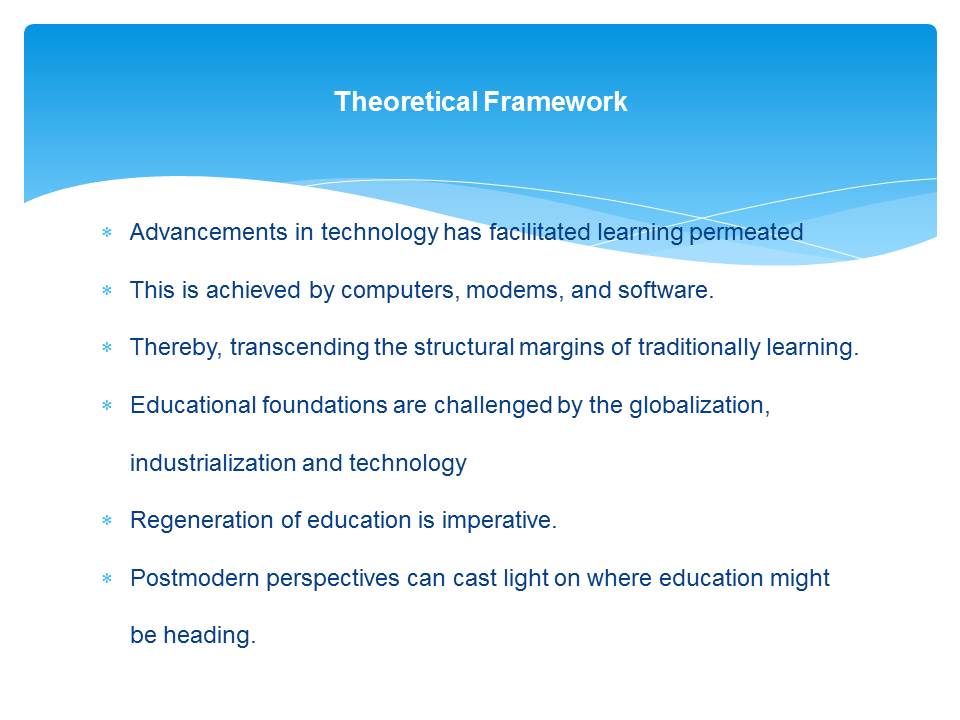
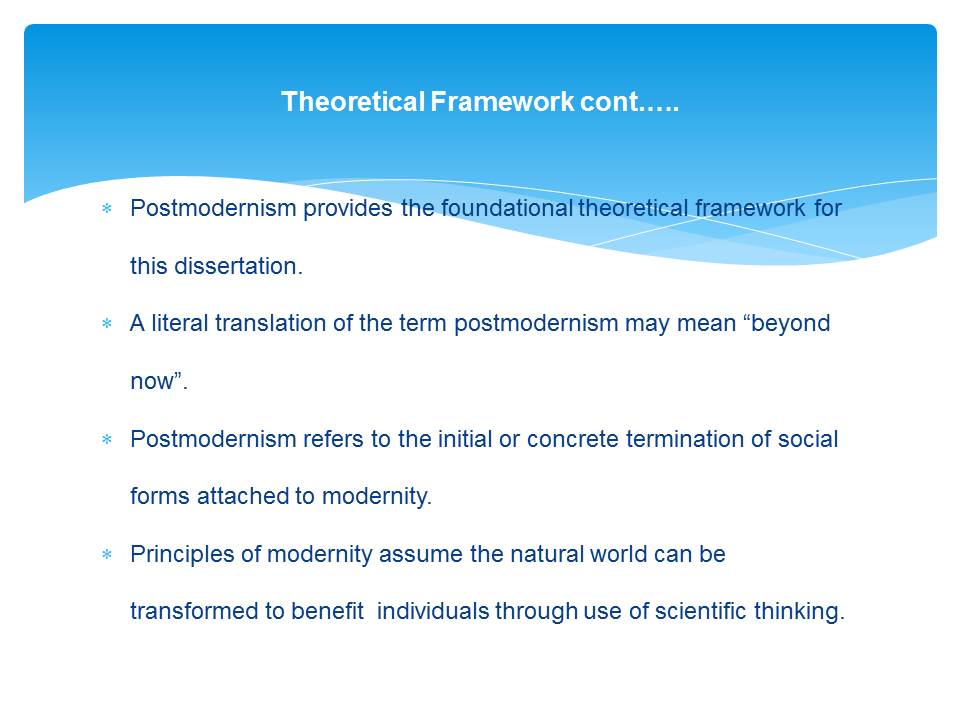
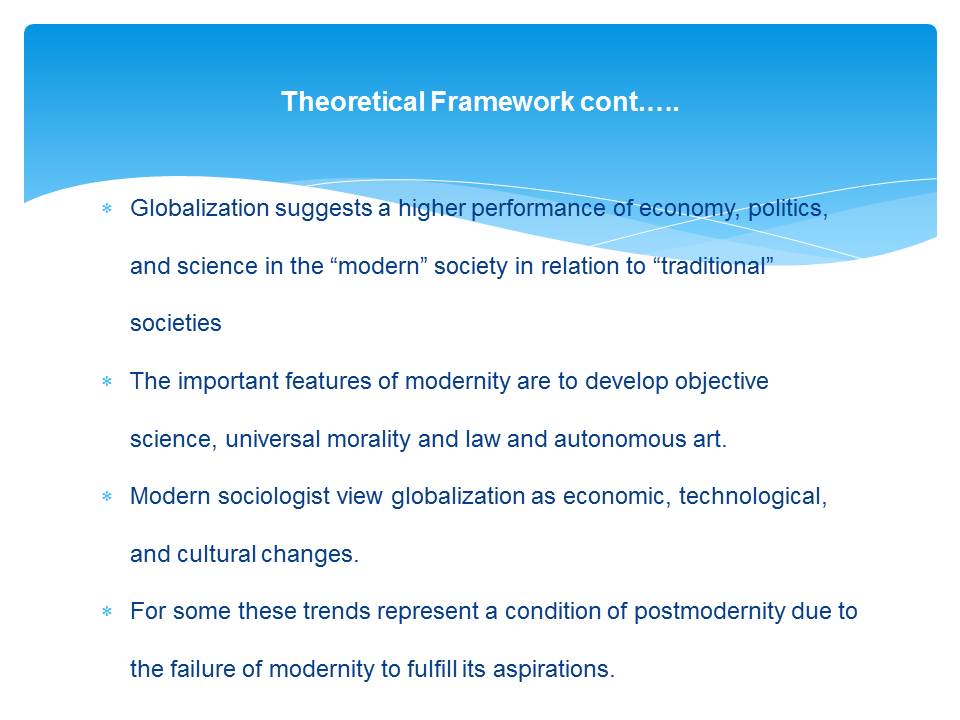
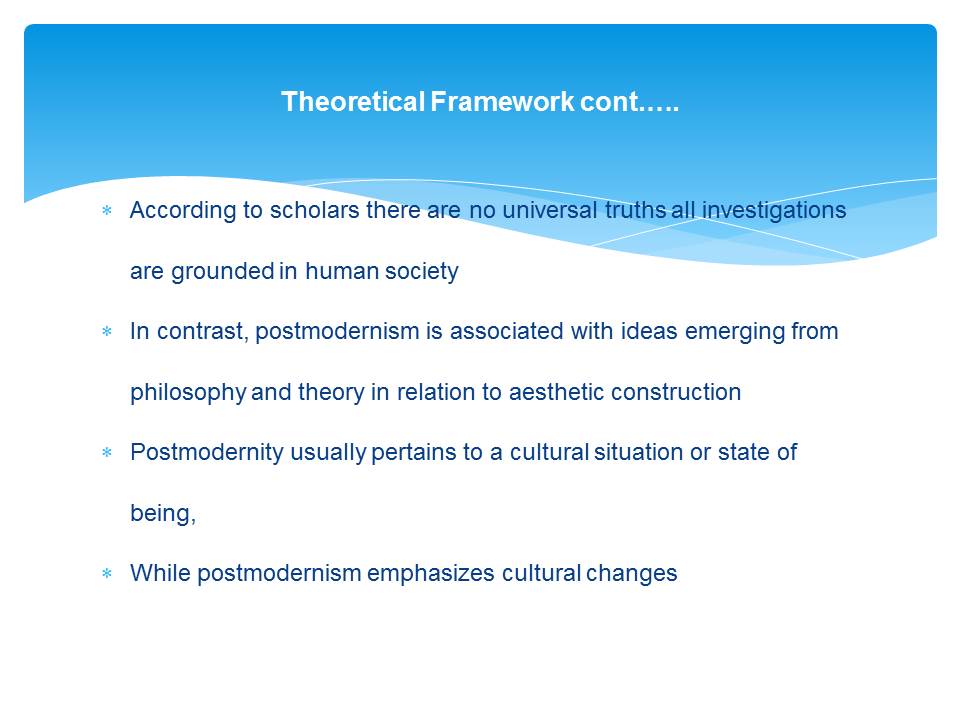
Literature review
- In the past decades, various scholars attempted to theorize frameworks associated with their comprehension of distance learning.
- The role of technology is teaching as a model of imparting knowledge through technical media.
- Theories of distance learning are independence and autonomy, of industrialization, and interaction/communication.
- Distance learning is composed of two main elements: “the dialog,” and “the structure.”
- This theory is known as “transactional distance,” which is a “typology of all education programs.
- The advent of online education has filled obvious gaps in traditional face-to-face education.
- Distance learning does not allow immediate answers to questions from the instructors which is a disadvantage.
- In a study of in-service teachers, subjects had unique motivating factors, perceptions, and challenges related to experiences with distance learning.
- The study showed how one teacher never expected this learning experience to influence her teaching life but eventually recognized the existing distinctions between the different spheres of life.
- Defining and communicating to students what is to be taught about each participant’s role and responsibility.
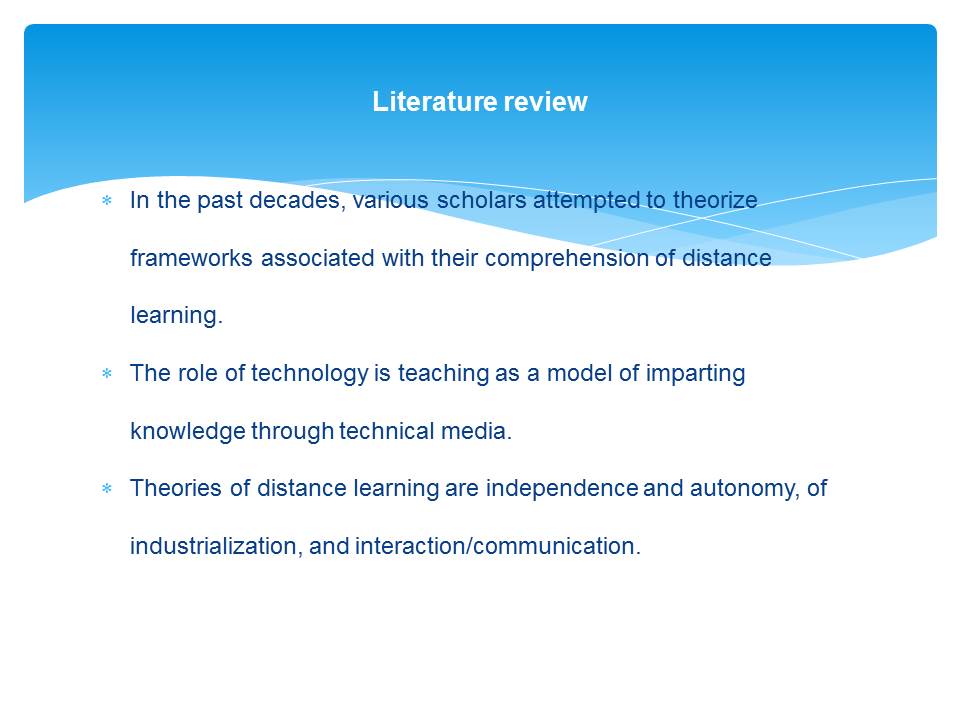
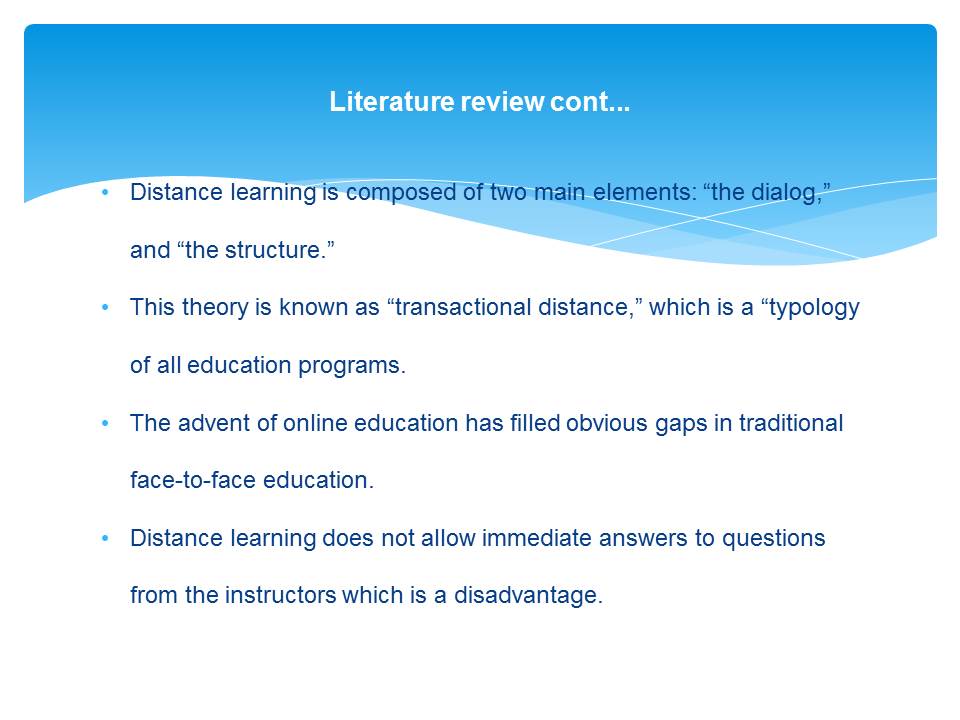
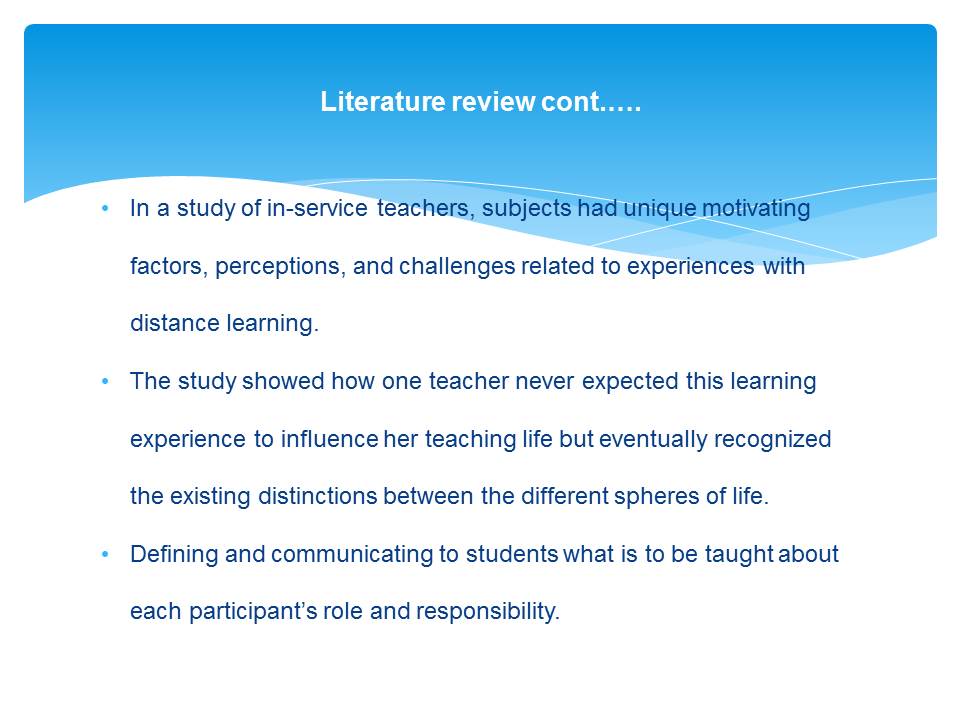
Methodology
- A qualitative approach was deemed appropriate because the inquiry is useful for understanding the phenomenon described in Chapter 1.
- A quantitative research method focuses on human social issues through testable predictions based on variables.
- The choice of qualitative or quantitative study is based upon the state of knowledge and the researcher’s position regarding a topic.
- A qualitative approach is suitable for the present study because it provides a representation of the true experience of participants.
- Qualitative researchers argue that, in the absence of the close connection with the object of study, results will be distorted”
- Thus, the present study incorporated face-to-face interviews.
- The sample group for the study consisted of in-service music teachers who used distance learning methods.
- A list of students from distance learning master’s program was compiled from the 2008 Alumni Directory of Cambridge College.
- In special situations, the use of a purposive sample is chosen as the form of data collection .
- The interview schedule was intended to maximize the target population’s ability to share lived experiences.
- For maximum validity, the questions were designed to request in-depth information about the main research areas of the study.
- NVivo software was used to analyze the data collected as an appropriate tool for qualitative analysis.
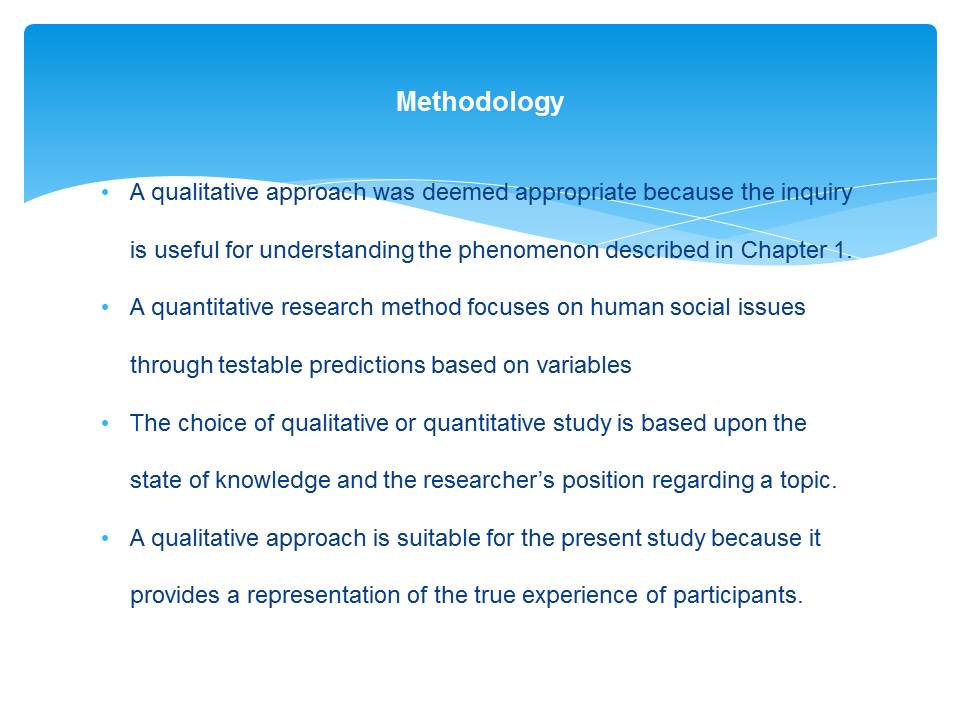
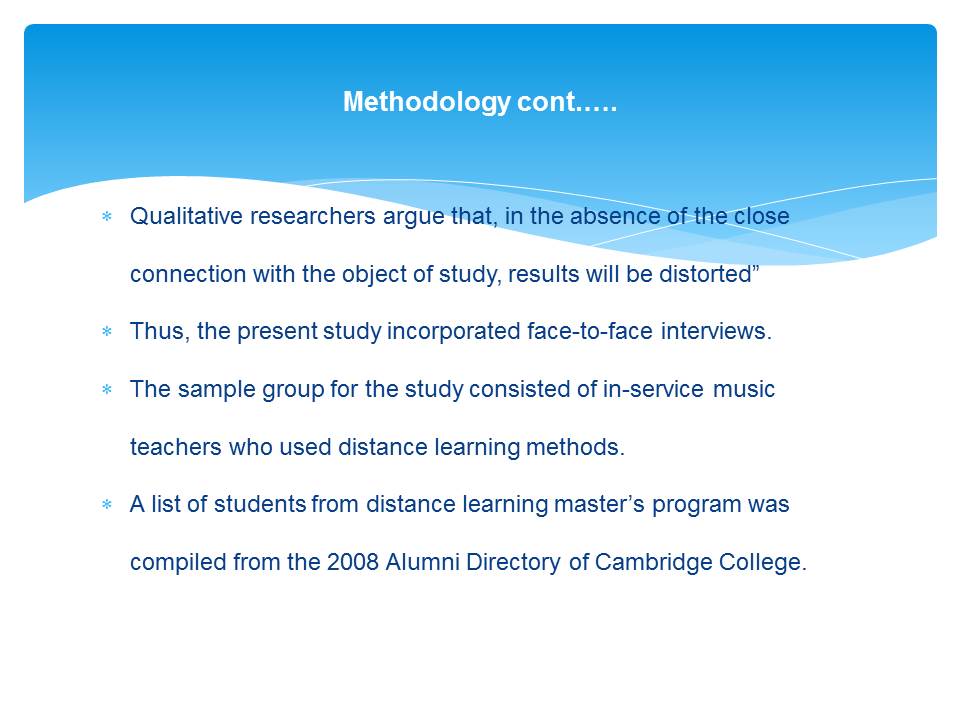
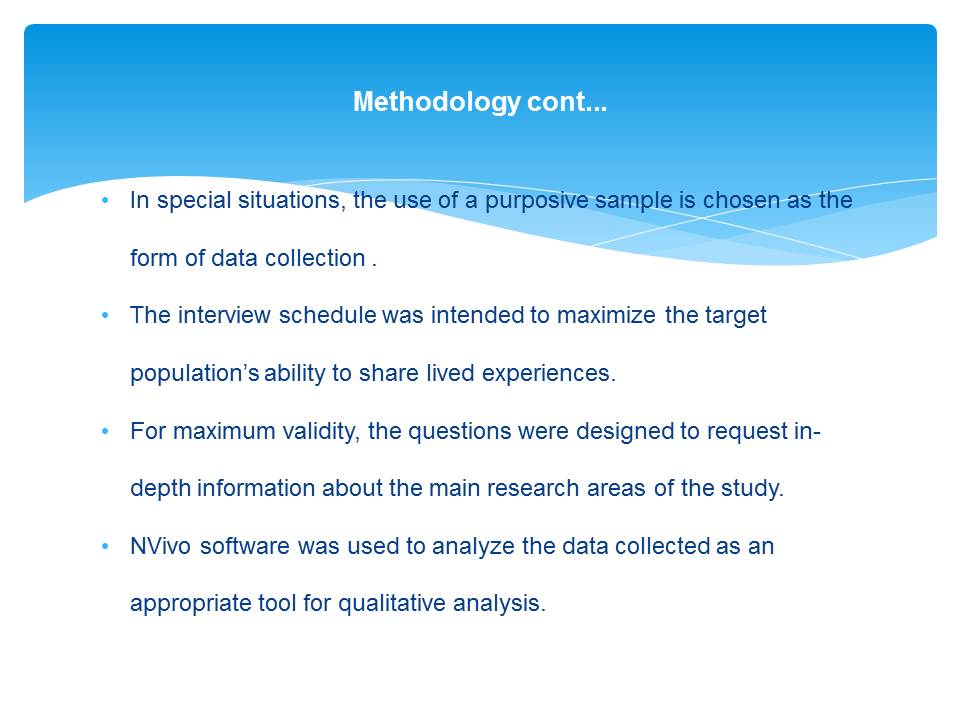
Results and analysis interpretation
- Of the respondents (10 of 12) described their experience as “Good Learning Option”.
- This indicate that they were satisfied with the experience.
- But a minority (2 of 12) of the respondents described it as “Bad Learning Option,”.
- This indicate that they were dissatisfied.
- The results showed that majority of the students were satisfied with the experience.
- Analysis of the expectations/ suggested they were the main factors that affected distance learning experience.
- Almost half of the respondents (5 of 12) joined the online program.
- They had a desire to excel in their career and become better teachers.
- Those who cited convenience as an advantage, felt that the acquisition of increased knowledge was the most valuable benefit gained from the program.
- The results of the study showed the various experiences that participants gained while pursuing their master’s degree.
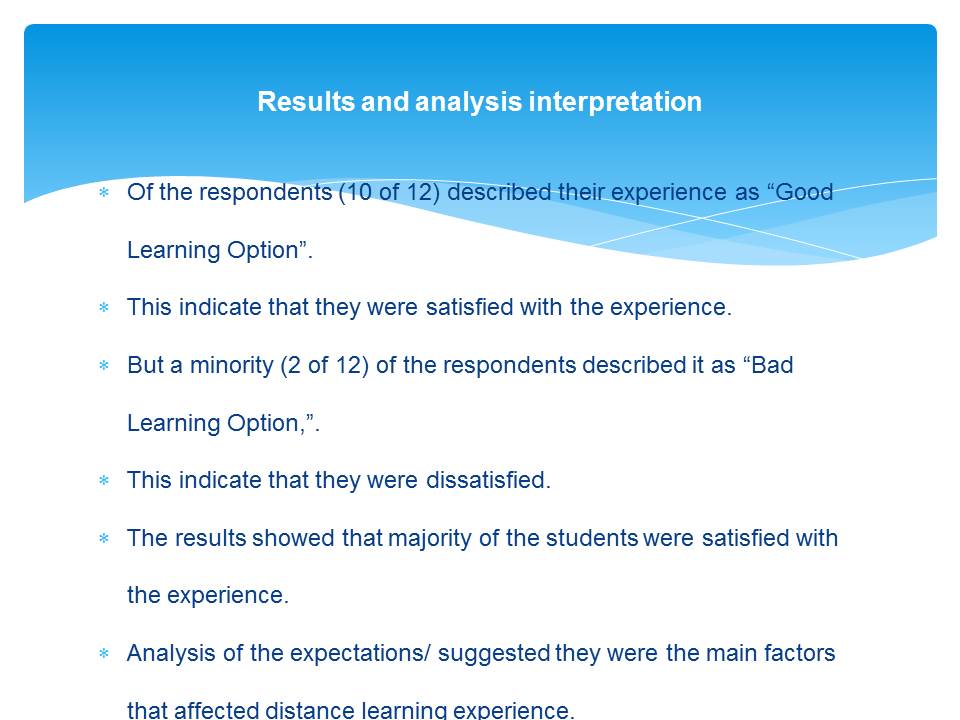
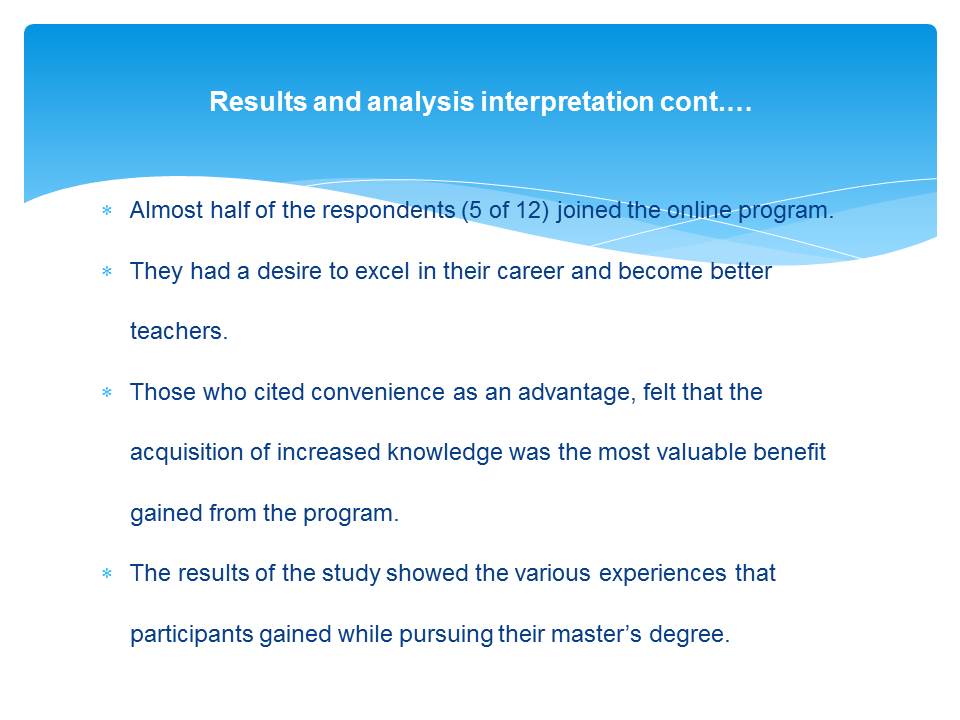
Discussion
- Relatively, results were evaluated according to the implications that they contain.
- This was in relation to the current educational setting of the participants in relation to postmodernism.
- Experiences did not differ much and leaned towards increased capacity and ability and in handling aspects of education.
- Reasons of the participants were varied, personal enhancement and financial motivation were the common factors.
- Participants strongly preferred the convenience and flexibility of online degrees which allowed them to study at home.
- Respondents benefited from distance learning mostly in the enhancement of their teaching skills and capabilities.
- Distance learning programs bring in the elements of inquiry-based learning and liberal education patterns.
- The programs assist in the expression of better academic ideas.
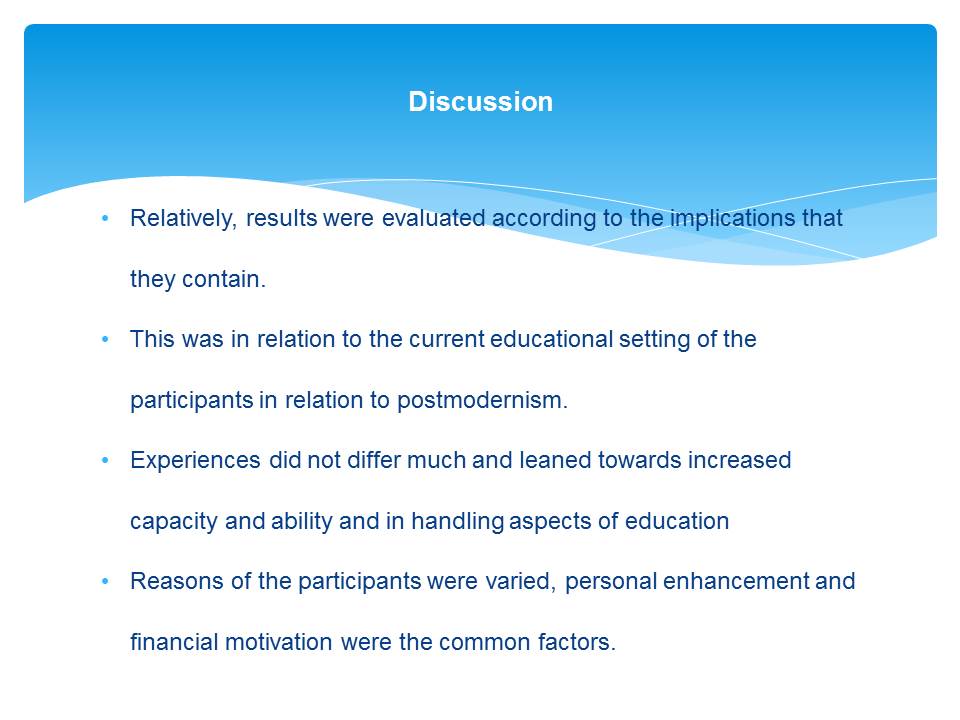
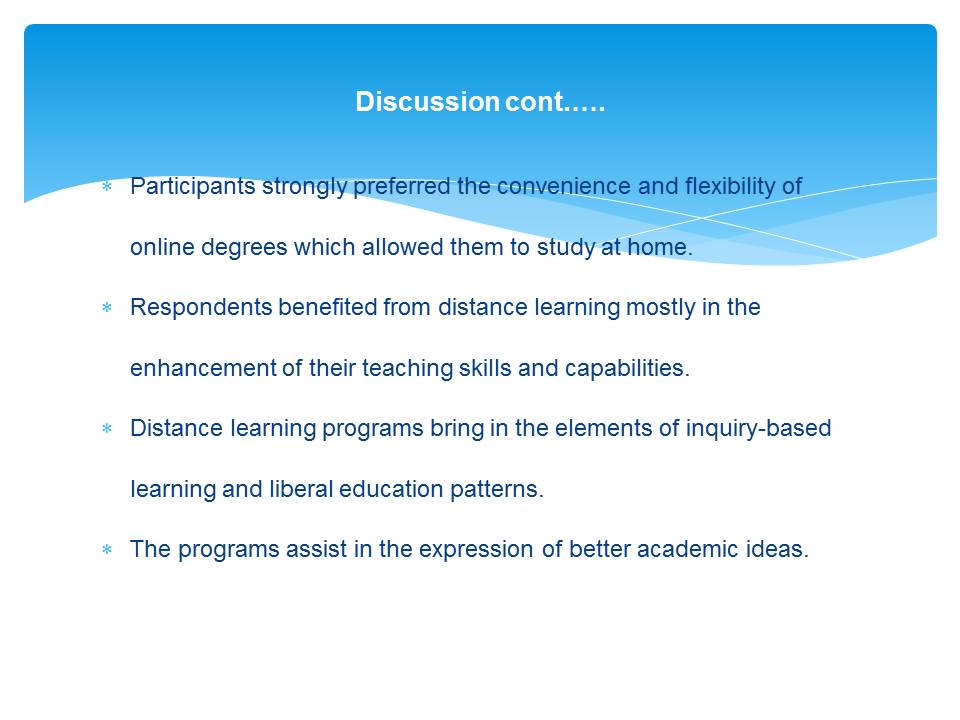
Summary, Conclusions and Recommendations
- The purpose of this study was to explore the experiences of in-service teachers who pursue a master’s degree through distance learning.
- This research examined the motivations of in-service teachers for pursuing a master’s degree through distance learning and the benefits reported.
- Understanding of distance education learning is explored through the lens of postmodernism.
- The concept of contemporary professionalism demands multidisciplinary approaches to create a positive impact through professionals.
- The pursuit of contemporary learning environment that provides solution for concerns in accessibility, funding, and quality learning.
- The ability to organize material within the system on a platform such as a PC.
- This will aid students in the continuation of course work when connectivity to the server is not available.
